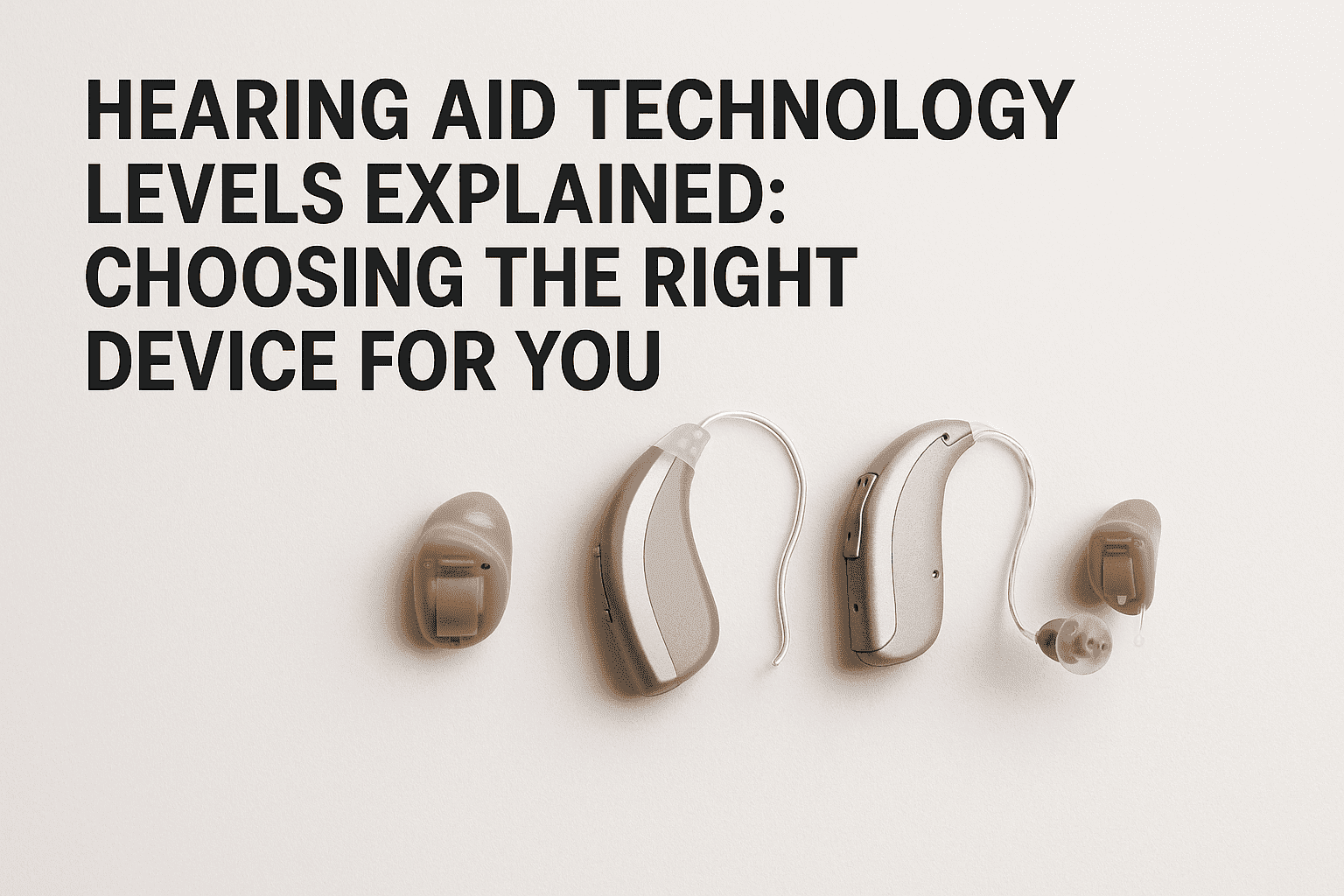Table of Contents
Hearing aids have evolved tremendously over the past decades, from simple amplification devices to sophisticated AI hearing aids with advanced features. Understanding the different hearing aid technology levels can help you select a device that fits your lifestyle, hearing needs, and budget.
This guide explains the key distinctions between basic vs premium hearing aids, their features like digital signal processing, adaptive noise reduction, and automatic programs, and how to make the best choice in Singapore.
Why Understanding Hearing Aid Technology Matters
Choosing the right hearing aid is not just about amplifying sound. Modern devices offer a wide range of features that impact:
- Speech clarity in noisy environments
- Comfort and ease of use
- Battery life and maintenance
- Integration with smartphones and other devices
Understanding the technology behind these devices ensures you get a solution tailored to your hearing profile. Professional evaluations at The Hearing Centre Singapore, including pure-tone audiometry, ABR/ASSR, and tympanometry, are essential before selecting a hearing aid.
Basic vs Premium Hearing Aids: What’s the Difference?
Hearing aids are typically categorized into basic and premium technology levels. Each level offers unique advantages depending on your hearing requirements.
Basic Hearing Aids
- Provide essential amplification
- Ideal for mild to moderate hearing loss
- Limited noise reduction and fewer automatic programs
- Cost-effective option for first-time users
Premium Hearing Aids
- Offer advanced digital signal processing
- Multiple automatic programs for different environments
- Superior adaptive noise reduction for clearer speech understanding
- AI-enabled features for self-adjusting to changing sound environments
- Connectivity with smartphones, TVs, and other devices
Understanding these differences helps you balance performance, convenience, and cost. Clinics like The Hearing Centre Singapore can demonstrate both options and guide you to the right choice.
Digital Signal Processing: Enhancing Sound Quality
Digital signal processing (DSP) is a cornerstone of modern hearing aids. It converts sound waves into digital signals, allowing devices to:
- Amplify speech while reducing background noise
- Adjust frequencies to match your specific hearing loss
- Provide consistent sound quality across various environments
DSP technology is available in both mid-range and premium devices, but AI hearing aids take it further with adaptive algorithms that learn from your listening habits.
Adaptive Noise Reduction: Focus on What Matters
Noisy environments can make conversation difficult even with a hearing aid. Adaptive noise reduction helps by:
- Minimizing background noise automatically
- Enhancing speech clarity in social gatherings, restaurants, and public spaces
- Adjusting in real-time without manual intervention
Premium devices often include advanced adaptive noise reduction features, making them ideal for people with active lifestyles or frequent exposure to challenging listening situations.
Automatic Programs: Seamless Hearing Across Environments
Modern hearing aids come with multiple automatic programs that adjust settings for:
- Quiet conversations
- Crowded or noisy environments
- Outdoor settings
- TV or multimedia use
These programs operate intelligently, so you don’t need to manually switch modes. Many AI hearing aids even learn your preferences over time for a fully personalized listening experience.
AI Hearing Aids: The Future of Hearing Technology
AI hearing aids represent the pinnacle of hearing technology:
- Automatically adjust to your listening environment
- Recognize speech versus background noise
- Optimize clarity based on your hearing profile
- Offer connectivity and smart features for convenience
With AI integration, these devices go far beyond basic amplification, providing a natural listening experience. Brands like Signia, Phonak, and Starkey offer AI-enabled solutions suitable for various hearing needs.
Choosing the Right Technology Level
When deciding between basic, mid-range, and premium hearing aids, consider:
- Degree of Hearing Loss – Severe hearing loss often requires premium devices with advanced features.
- Lifestyle Needs – Frequent social interactions or noisy environments may benefit from AI features and adaptive noise reduction.
- Budget – Basic devices are cost-effective, but premium options provide long-term convenience and performance.
- Connectivity – If you use smartphones, TVs, or remote microphones, ensure your device supports these integrations.
Professional guidance at The Hearing Centre Singapore ensures your device is tailored to your individual needs, including ear measurements and post-fitting support like hearing aid repairs and adjustments.
Additional Considerations
Selecting the right hearing aid involves more than just comparing BTE and ITE devices. Evaluating additional factors ensures you choose a device that matches your hearing needs, lifestyle, and personal preferences.
1. Battery Type
Modern hearing aids offer two main battery options:
- Rechargeable Batteries – Convenient and eco-friendly, rechargeable devices reduce the need for frequent battery replacements. Most models provide a full day of usage on a single charge and include quick-charge options.
- Disposable Batteries – Smaller devices, such as ITE or CIC aids, often use disposable batteries. These may require weekly or bi-weekly replacements depending on usage and device settings. Understanding your routine and convenience needs is key when selecting a battery type.
2. Design & Comfort
Hearing aids come in various designs to suit individual preferences:
- Behind-the-Ear (BTE) – Offers powerful amplification, larger batteries, and is suitable for all levels of hearing loss.
- In-the-Ear (ITE) – Custom-molded for a discreet, snug fit, ideal for mild to severe hearing loss.
- Completely in the Canal/ Invisible In Canal (CIC/IIC): Small custom Hearing devices that fit deep inside the ear canal, almost invisible
- Receiver-in-Canal (RIC) – Combines a discreet look with effective sound delivery, with the receiver placed directly in the ear canal.
Comfort is crucial, especially for all-day wear, so trying different designs with professional guidance ensures the best fit.
3. Durability
Durability affects the longevity and reliability of your device:
- Water Resistance – Protects against sweat, rain, or accidental splashes.
- Dust Resistance – Prevents debris from interfering with device components.
- Shock Resistance – Important for active users or those who may drop their devices.
Durable hearing aids reduce maintenance needs and provide confidence in everyday use.
4. Professional Support
Ongoing professional support is essential for maintaining optimal device performance:
- Regular calibration and adjustments to match changing hearing profiles
- Maintenance of ear molds, tubing, or electronic components
- Troubleshooting for connectivity, battery, or sound quality issues
Audiologists at The Hearing Centre Singapore offer these services, ensuring your hearing aid continues to function effectively over time.
5. Technology Level and Features
Modern hearing aids include a variety of technological advancements:
- Directional microphones for improved speech understanding
- Noise reduction algorithms for clearer listening in busy environments
- Smartphone connectivity for remote control and streaming audio
- Tinnitus management and sound therapy options
Evaluating these features along with your hearing needs and lifestyle ensures you select a solution that provides maximum benefit.
By carefully considering battery type, design, durability, professional support, and technology features, you can make a comprehensive choice that fits your hearing requirements, lifestyle, and personal preferences, ensuring long-term satisfaction and improved quality of life.
Conclusion
Understanding hearing aid technology levels is essential for anyone seeking improved hearing. Whether you choose basic vs premium hearing aids, leverage digital signal processing, enjoy adaptive noise reduction, or explore AI hearing aids with automatic programs, the right device can significantly enhance your quality of life.
Professional services at The Hearing Centre Singapore ensure accurate evaluation, customized fitting, and ongoing support, helping you get the most out of modern hearing technology.
Frequently Asked Questions:
Premium devices offer advanced features like AI, adaptive noise reduction, and multiple automatic programs, whereas basic hearing aids provide essential amplification.
It converts sound into digital signals, allowing precise amplification, noise reduction, and frequency-specific adjustments.
It minimizes background noise in real-time, focusing on speech and improving clarity in noisy environments.
Programs that adjust settings for different environments, such as quiet conversations, noisy areas, or multimedia use.
Yes, AI hearing aids automatically optimize sound based on your environment and listening habits for a more natural experience.
Many modern devices support Bluetooth or wireless connectivity for seamless integration.
Regular check-ups are recommended to ensure optimal performance and comfort.
Yes, but the benefits are more pronounced in moderate to severe hearing loss, noisy environments, or active lifestyles.
Professional clinics like The Hearing Centre Singapore often provide trials and demonstrations to find the best fit.
With proper care and maintenance, modern hearing aids can last 5–7 years or more.

Evlin is passionate about helping people with hearing loss. With years of experience in audiology, she has diagnosed and treated a wide range of hearing conditions across all age groups. She is accredited to conduct comprehensive hearing assessments and provide treatments for patients from newborns to the elderly. Committed to personalized care, she strives to empower patients to fully engage in life with better hearing.
Designation: Clinical Audiologist
Qualification: Bachelor of Health Science (Honours) (Audiology), University of Science Malaysia
Membership: .Society of Audiology Professionals in Singapore (SAPS)
